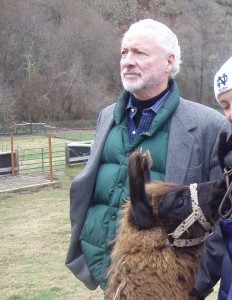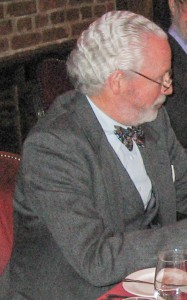How to Get More Ewe Lambs: Could Monty Hall Beat Mother Nature in the Gender Lottery?
No sooner had I first posted about the ewe/ram lamb coin toss than my brother Jim started firing off emails to me on the finer points of odds-making, including an old game show involving cars and goats. Ordinarily I would ignore anything that concerned goats rather than sheep, but I decided to throw down a sibling gauntlet. You see, Jim also is a retired lawyer and also is an online commentator, but he prattles on about financial auditing, large accounting firms, the SEC and other regulators, risk management, and related topics even more mind-numbing than the genetics of heritage sheep. So I asked him to write a guest blog — a historic first for The Chronicles. Here’s what he has to say on the subject of the Soay lamb ewe/ram coin toss as seen through the eyes of none other than Monty Hall.

Guest blogger Jim Peterson looking over the pastures at Saltmarsh Ranch while admiring baby llama Hank
Ewes are prized – rams, not so much. Shepherds engage in all manner of springtime rituals, in vainly optimistic attempts to propitiate the gods of genetics in favor of a beneficial ratio.
Mother Nature’s 50/50 sex division will not be fooled — at least if the lamb pool is sizable enough to be governed by the law of large numbers. So how about an exercise I use with my business school students in Risk Management, which helps them with the challenges of probability analysis and the handling of quantitative information.
In simpler words — suppose the lambs could be selected by sex in a version of the classic television game show, “Let’s Make a Deal,” originally hosted by Monty Hall.
The shepherd would be shown the closed doors to three lambing pens. Behind one door is a valuable ewe lamb; behind the other two are far less desirable rams. The shepherd-contestant picks a door — if she chooses correctly, she wins the prize ewe.
She chooses. But before the consequences are revealed, Monty Hall calls a pause. He opens one of the other doors, to reveal a ram. Her selected door, and the third, both stay unopened.
As audience suspense builds, Monty Hall further proposes — ahead of a commercial break and to build the anticipation — that before the two remaining doors are opened to show the outcome, the shepherd may — as an option and only if she wishes — change her choice, and switch from her original pick to the other unopened door.
Should she switch? Why or why not? What should she do?
Perhaps counter-intuitively, there is a definitively right answer which does not guaranty the prize, but which does double the shepherd’s chances, and so would have dramatic results over an entire lambing cycle.
(It is important to note in passing that, as presented here, Monty Hall is playing a mostly honest game — the prize is placed at random, and although as the host he knows its location, he does not move the prize during play nor otherwise fiddle the results. The correct strategy is compelling under the brute requirements of the laws of probability — which does not make it any more “rigged” than the honest if inevitable casino odds that send roulette and craps players home from Las Vegas clad only in their IOU’s.)
So how did you come out?
Those in the audience who either don’t know or can’t explain their intuitive strategic position would join a very large crowd of my friends and clients in the worlds of banking and finance — gate-keepers of the large-country economies and their global capital markets — who when confronted with this exercise consistently perform no better than if they were dumb … well, small wooly mammals of modest intellectual endowment.
An admittedly unscientific survey has suggested that Soay shepherds do better on the Monty Hall problem than bankers, lawyers or accountants. Pity for them, then, in their earnest desire to breed for desirable characteristics, such as horn length and shape, coloration of face and feet, and most importantly, the ewe/ram numbers, that Monty Hall is not available to adjust the odds in their favor.Postscript: Kevin Spacey as the high-school teacher in the film “21” deals in summary fashion with the Monty Hall problem — here’s the YouTube clip. A fuller written treatment is here.
Anyone still unconvinced is invited to contact me [jrpllc @ mac . com], and we will play the game as a contest for non-trivial sums of money until one of our stakes is depleted – with the caveat that this is an offer none of my suit-and-tie friends has ever been willing to accept.”
Thank you, Jim, for your inaugural guest column. If anyone else out there, including my brother Chris or my sister Sarah, cares to submit a guest column, I promise I will try to fit it in between discussions of horn phenotypes, the finer points of dipping navels in iodine, and pasture rotation.
For now …
